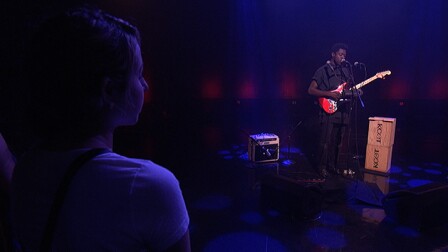
Rodrigo Amarante: Searching For Home
Watch Rodrigo Amarante's full performance on KCET-TV. Click here for future air dates.
Rodrigo Amarante never chose to stay in Los Angeles. In fact, the Brazilian musician thought Los Angeles was "strange" in comparison to the other cities he had visited. This place was different. However, opportunities keep bringing Amarante back to Los Angeles.
Here Amarante worked with Devendra Banhart and then returned to write music with Fabrizio Moretti, drummer for The Strokes. The Amarante/Moretti collaboration endured. They started the group Little Joy with Binki Shapiro. Moretti also did a bit of work on Amarante's solo album, "Cavalo." After staying in Los Angeles for months at a time, Amarante started to see the city differently. "The culture here is not so much like in New York where you go to bars and you go out and you think that everything is happening," he says. "Here, everything is happening in people's backyards. So slowly, as I met people here, I realized one thing that was very interesting about this place is that it relates to the genesis of the West."
"California is the West of the West," he continues. "People come here to look for something very improbable some dream that would otherwise be ridiculous somewhere else, or to run away from ghosts that are present from somewhere else. They look for gold."
Eventually, Amarante warmed up to Los Angeles and decided to stay. "The city, from my point of view... groups all these people who are free and they mix with all different kinds of groups and are very open-minded.
In Brazil, Amarante is best known as part of the band Los Hermanos, which hit big in Brazil at the end of the 20th century. He has played in other bands too, like Orchestra Imperial, but admits that its Los Hermanos that has earned the most attention over the years. Los Angeles was a place where Amarante could do something new. He wasn't as well known here as he was in Rio de Janeiro. "It's a great feeling that you can go somewhere where no one knows you and write and see what the reaction is going to be," he says. Adding to the excitement of creating in a new place, Amarante got to do that in a different language. He couldn't pass up a chance like this one.

"The good thing about traveling is that you are not surround by your environment, so you feel different," says Amarante. "You feel like you're looking at things differently." Amarante took advantage of that situation while working on "Cavalo," his first solo album.
"I wanted to be alone to write," says Amarante, "just to doubt identity, to talk about memory, to go back and realize how much of it is invented."
Since the musician hadn't worked on his own prior to the move to L.A., he knew the album would be a testament to his identity as a solo artist. However, that's not really something he wanted. Amarante is more concerned with the disconnect between how he saw himself and how others viewed him. "The idea that I have of myself is very different than the idea that you have of me," says Amarante, "and I think that's interesting."
While Amarante wrote plenty of songs prior to "Cavalo," this was the first time he wasn't writing for a band. Before, he would write knowing that he could go to his bandmates and bounce ideas off of them. On his own, he found another way to work. "I started to feel that there was a sort of double of me present in the room," he says, "maybe because I need an accomplice to that experience which I couldn't share with anyone else."
He expands on the idea of the two facets of his personality at work on the album. There's the side of Amarante that is "in love with the process" of making music and the side that just wants to get it done. All these things are at play in the album's title. There's more to "Cavalo" than just "horse."
"In Brazil and other countries where there is a mix between African religion and spiritualism and all that, we say the 'cavalo' is the person who receives the spirit, the person that serves as a vehicle for something external," he explains. "So, if you believe in spirits, it would be a spirit. If you don't, it would be some sort of shade of the psyche that manifests."

"Cavalo" is a multi-lingual album; there are songs in Portuguese, English and French on it. Amarante connects the use of multiple languages to the sense of space he creates with the music itself. "I'm trying to tell your story, not mine," he says. "I'm trying to leave enough space so that it will reflect something that you have in you."
Similarly, there are parts of language that are open to interpretation. "When you're a foreigner, in the beginning when you're learning a language, you find yourself not understanding half of what's being said," he says. "Either literally, you don't know the words, or you don't comprehend the meaning or you don't get the sense of humor, etc." However, he points out, sentiments are often conveyed by means other than verbal language. There is body language as well as the way people learn words through context and what he calls "the music of the words." Mixing languages on the album was a way for Amarante to address the ideas and concepts that he wanted to explore.
"I wanted to make a point about space and about our time too," says Amarante. "Each record has to be louder than the next, so dynamics disappeared from recordings. Because there's so much space, virtual space, there is a competition for space." Amarante made an album that forces the audience to pay close attention. He mentions the cover for "Cavalo." There is none. He uses a lyrics sheet to mark the release instead of flashy graphics. He notes the tiny font used as well. "To see what's in it, you have to stop and go in," he says.
He made some bold choices with "Cavalo," from the design to the album to the music itself. "Making a record that's half Portuguese is risky," says Amarante. But, these were also important choices that further the musician's vision. He says, "I wanted to reflect what was happening in my head."











